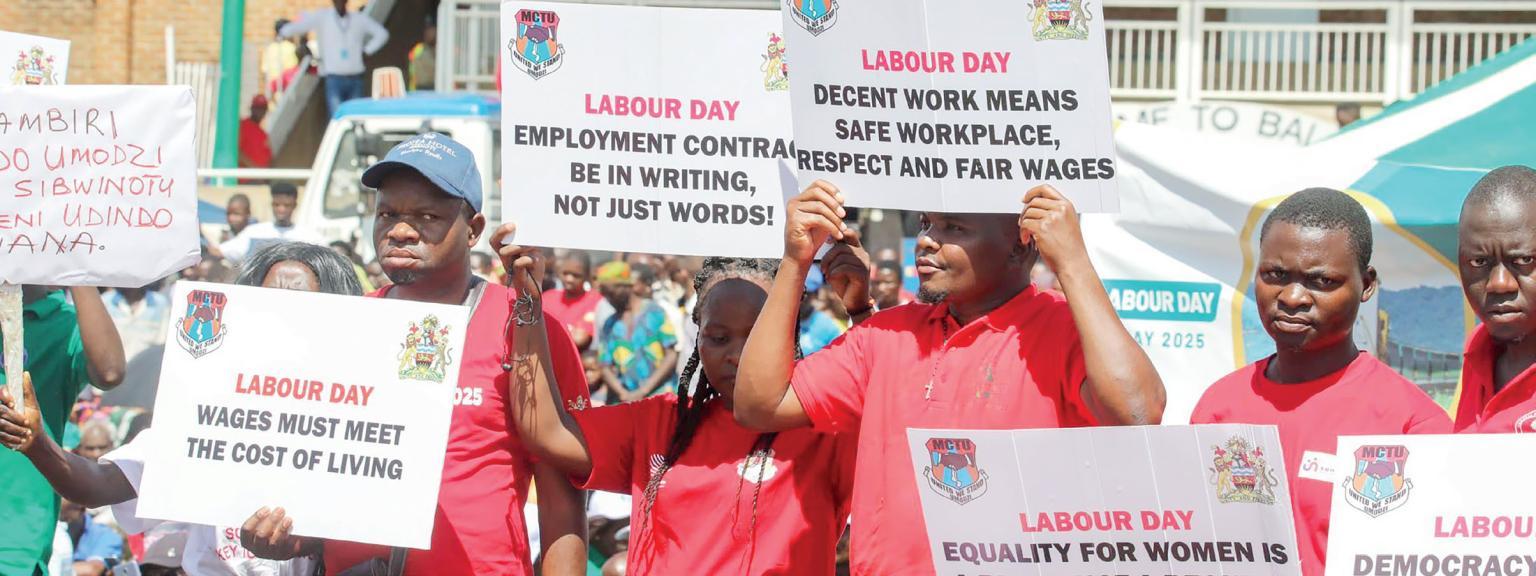
Africa-Press – Malawi. As Malawi marked International Labour Day on Wednesday, the country’s leading workers’ rights groups and employers issued a strong call to government: tame the rising cost of goods and ease the economic pressures strangling job creation and workers’ livelihoods.
Speaking at a national commemoration held at Balaka Stadium, Malawi Congress of Trade Union (MCTU) president Charles Kumchenga said the soaring prices of basic commodities—driven in large part by persistent foreign exchange shortages—are leaving workers unable to meet even their most basic needs.
“The cost of living has gone up significantly due to the continued rise in prices of essential goods,” said Kumchenga. “As it stands, the current wage is far from meeting the needs of an average worker.”
Kumchenga pleaded with the government to take urgent action to prevent further price hikes, warning that workers are being crushed by inflation while their wages remain stagnant.
He also raised alarm over companies failing to remit pension contributions to fund managers despite deducting them from employees’ salaries, and highlighted ongoing non-compensation of injured workers.
However, he commended the Ministry of Labour for conducting inspections that have helped expose exploitation and improve compliance in some workplaces.
Anne Chavula, president of the Employers Consultative Association of Malawi (ECAM), echoed the union’s concerns, warning that economic instability—especially the forex crunch and rising prices—was undermining efforts to create decent work.
She called for joint solutions and quicker policy implementation, including:
Establishing a Workers’ Compensation Fund
Mainstreaming the National Child Labour Policy
Ratifying ILO Convention 190, which calls for workplaces free of violence and harassment
“We must act together to build inclusive wealth and achieve the goals of Malawi 2063,” Chavula urged.
Wellington Chibebe, ILO Country Director for Malawi, Mozambique, and Zambia, praised Malawi for conducting legal reviews that bring the country closer to ratifying Convention 190, describing it as a step toward safer, more dignified work environments.
“It is our hope that Malawi will support the code in both text and practice to improve the daily lives of workers,” Chibebe said.
Responding to the concerns, President Lazarus Chakwera said while government is aware of the economic pain workers face, much of the recent price inflation is being driven by “greedy traders” raising prices unjustifiably.
“We are engaging with the traders, and some have already begun lowering prices,” said the President. “But to further ease the burden, my government will soon revise the minimum wage to boost workers’ disposable income.”
Chakwera added that his administration is committed to worker protection, announcing that the Ministry of Labour will intensify company inspections after the September 16, 2025, General Elections to clamp down on workplace abuse.
Minister of Labour Peter Dimba, who was appointed in February this year, pledged to breathe new life into the government’s job creation and labour rights agenda, aligning with this year’s Labour Day theme:
“Democracy that Works for Decent Work for All.”
The celebrations began with a solidarity march from Chingeni Roadblock to Balaka Stadium, where President Chakwera joined workers on the final stretch. At the stadium, he launched a new Code of Conduct on violence and harassment in the workplace.
The event also featured national awards:
Best Employer Award: Standard Bank plc
Quality, Productivity & Innovation Award: Malawi Liverpool Wellcome Programme
Labour Laws Compliance Award: Castel Malawi Limited
With workers demanding real relief, employers seeking stability, and government pledging reforms, Malawi’s path to decent work and shared prosperity hinges on how soon these promises translate into action.
For More News And Analysis About Malawi Follow Africa-Press





